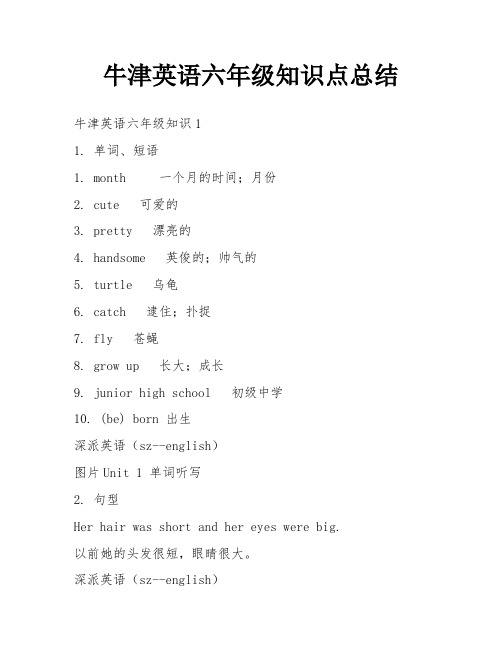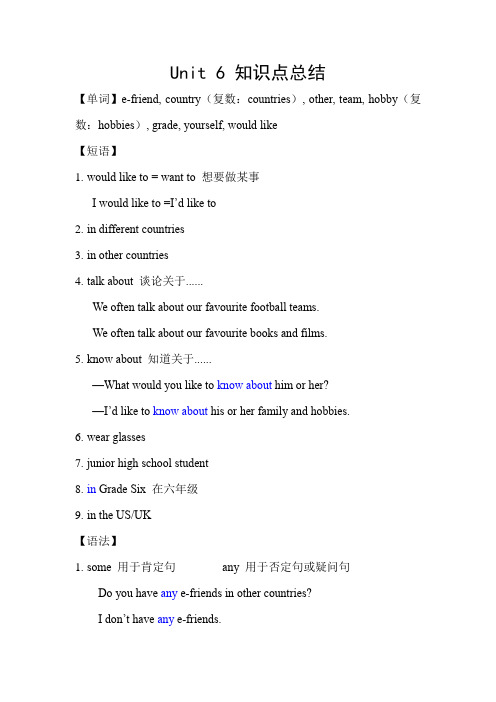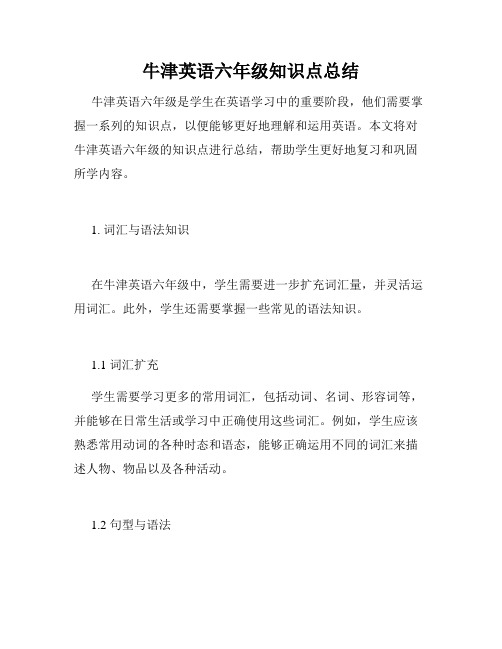新版牛津英语六年级上册知识点小结
牛津英语六年级知识点总结

牛津英语六年级知识点总结牛津英语六年级知识11. 单词、短语1. month 一个月的时间;月份2. cute 可爱的3. pretty 漂亮的4. handsome 英俊的;帅气的5. turtle 乌龟6. catch 逮住;扑捉7. fly 苍蝇8. grow up 长大;成长9. junior high school 初级中学10. (be) born 出生深派英语(sz--english)图片Unit 1 单词听写2. 句型Her hair was short and her eyes were big.以前她的头发很短,眼睛很大。
深派英语(sz--english)图片Unit 1 Lisen and say 听写图片Unit 1 Read a story 听写3. 重难点1.一般过去时表示过去某个时间里发生的动作,常和表示过去的时间状语连用,如:yesterday,last night,this morning,in 1990,ago,since 1999,last(week,year,night,month...)等。
2.过去式顺口溜动词一般过去时,表示过去发生的事;一般动词加ed,若是特殊得硬记;be 用was 或用were,have,has变had;谓语动词过去式,过去时间做标志;否定句很简单,主语之后didn't添;疑问句也不难,did放在主语前。
牛津英语六年级知识21. 单词、短语1. famous 著名的;出名的2. during 在......期间3. spend 度过4. everyone 每个人;所有人5. countryside 乡村;农村6. pick 采摘7. summer holiday 暑假深派英语(sz--english)图片Unit 2 单词听写2. 句型1. How was your summer holiday?你的暑假过得怎样?2. It was wonderful!We went to the Great Wall.非常棒!我们去了长城。
牛津英语六年级上册第6单元知识点归纳

Unit 6 Going to school1. traveling time to school 去学校行走时间2. it takes sb. some time to do sth. 某人花一段时间做某事3. It takes him about ten minutes. 他花大约十分钟。
4. half an hour 半小时5. go to sp. by ferry 乘渡船去某地6. go to school on foot=walk to school 步行去学校7. how long 多久8. get to sp. 到达某地9. get to the supermarket 到达超市10. get there/here/home 到达那儿/这儿/家里11. a restaurant 一个饭店12. a hotel 一个旅馆13. an advertisement board 一块广告牌14. a few + c.n. 几个;一些(后跟可数名词复数)15. a lot of + c.n. & u.n. 许多(后跟可数名词复数或不可数名词)16. on one’s way to school 在某人去某地的路上17. on my way to school 在我去学校的路上18. by light rail 乘轻轨19. department stores 百货商店20. go to kindergarten 上幼儿园语言点1. near 离…很近后面直接接地点I live near school.=My home is near school.我家离学校很近。
2. far away from=far from离…很远He lives far away from school.=His home is far from school.他家离学校很远3. by bus/bike/car/underground/train/ferry其他的交通工具都能用take来表示乘,但bike只能用ride take a bus/bike/car/underground/train/ferry ride a bikeHe goes to school by bus.=He takes a bus to school.He goes to school by bike.=He rides his/a bike to school.=He cycles to school. 4. on footShe goes to work on foot every day.=She walks to work every day.5. It takes sb. some time to do sth. 花费某人多少时间做某事。
牛津六年级英语上册知识点

牛津六年级英语上册知识点在牛津六年级英语上册中,学生将学习到许多重要的知识点,这些知识点将帮助他们更好地理解和运用英语。
下面将介绍几个重要的知识点。
一、动词的时态动词的时态是英语语法中的重要内容之一。
在六年级上册中,学生将学习到一些常见的时态,包括一般现在时、一般过去时和将来时。
1. 一般现在时:表示经常性的或普遍性的动作或事实。
例如:I play basketball every Saturday.(我每个星期六打篮球。
)2. 一般过去时:表示过去发生的动作或事情。
例如:She watched a movie last night.(昨晚她看了一部电影。
)3. 将来时:表示将要发生的动作或事件。
例如:We will have a party next week.(下周我们将举办一场派对。
)二、名词的单复数在牛津六年级英语上册中,学生将学习名词的单复数形式。
名词的单复数形式对于正确使用英语非常重要。
1. 单数名词:表示只有一个的事物或人。
例如:a book(一本书)、a cat(一只猫)。
2. 复数名词:表示有多个的事物或人。
例如:books(书籍)、cats(猫)。
三、形容词的级别形容词的级别表示事物的不同程度或者比较。
在六年级上册中,学生将学习比较级和最高级。
1. 比较级:用于比较两个事物或人的程度。
例如:My backpack is bigger than yours.(我的背包比你的大。
)2. 最高级:用于比较三个以上事物或人的程度。
例如:This is the most delicious cake I've ever had.(这是我吃过最美味的蛋糕。
)四、疑问句和否定句在六年级上册中,学生将学习到如何构造疑问句和否定句。
1. 疑问句:用于提问。
例如:Do you like ice cream?(你喜欢冰淇淋吗?)2. 否定句:表示否定的意思。
例如:I don't want to go to the party.(我不想去派对。
牛津版六年级上册Unit 6 知识点总结

Unit 6 知识点总结【单词】e-friend, country(复数:countries), other, team, hobby(复数:hobbies), grade, yourself, would like【短语】1.would like to = want to 想要做某事I would like to =I’d like to2.in different countries3.in other countries4.talk about 谈论关于......We often talk about our favourite football teams.We often talk about our favourite books and films.5.know about 知道关于......—What would you like to know about him or her?—I’d like to know about his or her family and hobbies.6.wear glasses7.junior high school student8.in Grade Six 在六年级9.in the US/UK【语法】1.some 用于肯定句any 用于否定句或疑问句Do you have any e-friends in other countries?I don’t have any e-friends.2.get... from...从......得到......I get your email from the E-friend Club.3.like + 动词ingI like playing football.love + 动词ingI love playing football.【句子】1.I have some e-friends in different countries.2.We both like football.3.反问对方:你呢?What about you?How about you?4.Would you like to have e-friends in other countries?—Would you like to have one?—Yes, I’d like to have an e-friend in the US.5.I’d like to be your e-friend.I’d like to be your e-friend too.6.I am from China. I am 11 years old, and I wear glasses.7.There are four people in my family: my father, my mother, my brother Ben and me.8.I go to Happy Primary School. I am in Grade Six.9.My favourite subjects are Maths and Music. I like singing and playingtable tennis. I also like reading.Science and English are my favourite subjects. I like playing football and chess.10.Please write back soon and tell me about yourself.Write soon.11.Thank you for your email and your photo.【国家和城市】AustraliaCanadathe UK Londonthe USFrance ParisJapan TokyoChina Beijing【复习回顾】1.be from...来自......He is from the UK.She is from China.2.人名’s ...的Peter’s e-friend Peter的网友Jill is Peter’s e-friend.Joe can be Kitty’s e-friend.【写作】注意写信、电子邮件的格式。
牛津英语六年级知识点总结

牛津英语六年级知识点总结牛津英语六年级是学生在英语学习中的重要阶段,他们需要掌握一系列的知识点,以便能够更好地理解和运用英语。
本文将对牛津英语六年级的知识点进行总结,帮助学生更好地复习和巩固所学内容。
1. 词汇与语法知识在牛津英语六年级中,学生需要进一步扩充词汇量,并灵活运用词汇。
此外,学生还需要掌握一些常见的语法知识。
1.1 词汇扩充学生需要学习更多的常用词汇,包括动词、名词、形容词等,并能够在日常生活或学习中正确使用这些词汇。
例如,学生应该熟悉常用动词的各种时态和语态,能够正确运用不同的词汇来描述人物、物品以及各种活动。
1.2 句型与语法在六年级,学生需要理解并运用一些复杂的句型和语法结构。
例如,学生应该能够正确使用比较级和最高级来进行描述,掌握被动语态的用法,理解并运用条件句和虚拟语气等。
2. 阅读理解阅读理解是英语学习中非常重要的一部分,通过阅读能够提高学生的语言理解能力和阅读能力。
在六年级,学生需要阅读各种不同题材的文章,并能够正确理解并回答相关问题。
2.1 理解词义学生需要通过上下文理解词义,掌握一些常见的词汇搭配和短语用法,从而能够准确理解文章中出现的生词和难词。
2.2 主旨大意学生需要能够通过阅读文章的段落和标题,理解文章的主旨大意,并能够回答与文章内容相关的问题。
3. 听力技巧在牛津英语六年级的学习中,学生需要提高自己的听力技巧,能够准确理解并回答听力材料中的问题。
3.1 听懂对话学生需要通过听力材料,能够听懂日常生活中的对话,包括人物的名字、地点、时间以及具体的活动内容。
3.2 提取关键信息学生需要通过听力材料,能够准确提取关键信息,包括人物的观点、意见、喜好等,从而能够回答与听力材料相关的问题。
4. 口语表达牛津英语六年级的学习也涉及到口语表达,学生需要能够流利地用英语进行口头交流,以及正确运用一些常用口语表达。
4.1 日常交流学生需要通过与他人的交流,能够用英语进行日常生活中的问候、介绍、询问信息等。
最新上海牛津版英语六年级第一学期6A期末复习知识点总结

the oneonthe left/right,the oneinthe middle=the left/right/middle one.
地点、方位表述
near 离**近
far (away) from离**(很)远
4、“体验化” 消费someeggs. a lot of milk. Plenty of eggs.
Some
any
some用在肯定句中,any用于否定和疑问句中。
I have some new books. Do you have any new books? I don’t have any new books.
副词
副词
表示动作特征或性状特征,一般用来形容或修饰形容词、动词、其他副词和句子。
用法
修饰形容词:He looks very happy.
修饰动词:The old lady is walking slowly now.
修饰句子:Luckily, he got the first prize.
次数副词
一次once, 两次twice, 三次及以上: 数字+times
too many
too much
getto school.到达那里”只能说 get there
reach 到达+某地
reach school
Leave 离开+某地
He will leave Shanghai.
方位词:
方位词
east / west / north / south / north-east / north-west / south-east / south-west
小学英语六年级上册(牛津上海版) Unit6 going to school 知识点总结

沪教(一起)6A Unit 6 Going to school 知识点总结1.traveling time to school 去学校行走时间2.it takes sb. some time to do sth. 某人花一段时间做某事3.It takes him about ten minutes. 他花大约十分钟。
4.half an hour 半小时5.go to sp. by ferry 乘渡船去某地6.go to school on foot=walk to school 步行去学校7.how long 多久8.get to sp. 到达某地9.get to the supermarket 到达超市10.g et there/here/home 到达那儿/这儿/家里11.a restaurant 一个饭店12.a hotel 一个旅馆13.a n advertisement board 一块广告牌14.a few + c.n. 几个;一些(后跟可数名词复数)15.a lot of + c.n. & u.n. 许多(后跟可数名词复数或不可数名词)16.o n one’s way to school 在某人去某地的路上17.o n my way to school 在我去学校的路上18.b y light rail 乘轻轨19.d epartment stores 百货商店20.g o to kindergarten 上幼儿园语言点1. near 离…很近后面直接接地点I live near school.=My home is near school.我家离学校很近。
2. far away from=far from离…很远He lives far away from school.=His home is far from school.他家离学校很远3.by bus/bike/car/underground/train/ferry动词短语:take a bus/bike/car/underground/train/ferry ride a bikeHe goes to school by bus.=He takes a bus to school.4. on foot 动词:walkShe goes to work on foot every day.=She walks to work every day.5. It takes sb. some time to do sth. 花费某人多少时间做某事。
牛津英语六年级上册英语的知识点

一、英语单词:六年级上册的英语单词主要包括日常生活中常用的词汇,如数字、颜色、食物、动物、身体部位、家庭成员、学校用品、季节、天气和节日等。
学生需要通过课堂学习和课后复习来巩固这些单词的拼写和发音。
二、语法:1. 名词复数形式:学生需要掌握名词变复数的规则,如在名词后加s或es,或者通过变化字母来表示复数形式。
2. 人称代词:学生需要学会使用I、you、he、she、it、we和they等人称代词,并正确地在句子中使用它们。
3. 动词的现在进行时:学生需要学会使用动词的现在进行时来描述正在发生的动作,如“I am eating.”和“They are playing.”4. 一般现在时:学生需要学会使用动词的一般现在时来表示经常性的动作或客观事实,如“I drink milk every morning.”和“The sun rises in the east.”5. 情态动词can和could:学生需要学会使用can和could来表示能力、允许、请求和建议等。
6. 物主代词:学生需要学会使用物主代词来表示所有权,如“his, her, their”等。
六年级上册的阅读材料主要以短文的形式呈现,学生需要通过阅读来理解文章的主旨和细节。
同时,还需要学会通过猜测词义的方式来推测生词的意思,并回答与文章相关的问题。
四、写作:六年级上册的写作部分主要包括书面表达和口头表达两方面。
学生需要学会使用正确的形式和句型来描述人物、事物、地点和活动等,并能够通过语言表达自己的思想和观点。
五、听力:六年级上册的听力部分主要包括听对话、短文和广播等形式的听力材料,并根据听到的内容回答相关问题。
学生需要学会提取关键信息,理解听到的内容,并正确地回答问题。
六、其他:除了上述几个主要知识点外,六年级上册的英语教材还包括了一些与英语学习相关的其他知识点,如词汇拓展、英语习惯用语、句子搭配等。
学生可以通过课外阅读和与外国人交流来进一步提升自己的英语水平。
- 1、下载文档前请自行甄别文档内容的完整性,平台不提供额外的编辑、内容补充、找答案等附加服务。
- 2、"仅部分预览"的文档,不可在线预览部分如存在完整性等问题,可反馈申请退款(可完整预览的文档不适用该条件!)。
- 3、如文档侵犯您的权益,请联系客服反馈,我们会尽快为您处理(人工客服工作时间:9:00-18:30)。
16a知识点小结Unit1:单词:month cute pretty handsome turtle catch flytwo months old, a primary school student, junior high school, grow up, be born, in the river, look around, catch flies, look like句型:Her hair was short and her eyes were big.She was a primary school student. She goes to junior high school. 语法:一般过去时,表示过去某个时间发生的动作或存在的某种状态,动词要用过去式,be动词am/is-was(单数), are-were (复数)Unit2:单词:famous, during, spend, everyone, countryside, pick summer holiday, go swimming, take phones, go back, on holiday have a good time, in the countryside, pick apples, , stay with sb., good/poor eating habits句型:How was your summer holiday?It was fun/ great/ wonderful/not bad.We went to the Great Wall, Tian’anmen Square and the Palace Museum.They spent their holiday in London. They had a good time. During the summer holiday, Jill stayed with her grandparents in the countryside.语法:1. 动词过去式变化规则:①直接加ed,清辅音后读/t/,浊辅音和元音后读/d/,字母t和d后读/ɪd/;②不发音e结尾加d;③辅音字母加y结尾,变y为i加ed;④重读闭音节,结尾只有一个辅音字母,双写结尾辅音字母加ed.2. 不规则动词过去式:go—went, take—took, spend—spent, have—had, come—came, do—did, ride—rode, eat—ate3. 一般将来时:表示将来某个时间将要发生的事情或存在的某种状态,句子结构为:人称+will+动词原形,例如:I’ll show you tomorrow.Unit3:单词:healthy, unhealthy, hamburger, cola, yesterday, fruit, pie, pizza, sandwich, vegetable, chicken, chocolate, a little, too much, fish and chips, be important to sb., have breakfast/lunch/dinner,a lot of, play sport句型:What did you have for breakfast this morning?I had two hamburgers and some cola for breakfast yesterday.You should drink some milk and eat some fruit.They do nor like rice, fruit or vegetables.Lily and Bob do not play sport very often.语法:陈述句:主语+动词过去式+其他否定句:主语+was/were + not +其他主语+ didn’t +动词原形+其他一般疑问句:Was/Were +主语+其他Did+主语+动词原形+其他特殊疑问句:特殊疑问词+ were/was/did +主语+ 动词原形+其他Unit4:单词:neighbour, son, daughter, noisy, owl, dig, last weekend, play chess, play table tennis, a noisy neighbor, make noise, have an idea, dig a hole, have a good sleep, go out, have fun, stop doing sth.句型:Did you play with Sam last weekend?Yes, I did./ No, I didn’t.语法:不规则动词过去式:make—made, can—could, dig—dug, sleep—sleptUnit5:单词:thousand, hundred, wild, way, die, rhino, learn, sendSouth China tigers, blue whale, in the past, in the wild, in danger, on one’s way home, take care of, go for a walk, drive aways句型:In the past ,there were many pandas, but now there are only about one thousand six hundred pandas in the wild.语法:1. 大数字的表达方法:一万ten thousand, 十万one hundred thousand, 一百万one million, 一千万ten million, 一亿one billion2. 不规则动词过去式:find—found, see—saw, drive—drove, grow—grew, learn—learnt/learned, send—sent Unit6:单词:e-friend, country, other, team, hobby, grade, yourself短语:would like to do sth., in different countries, in other countries, know about sb., wear glasses, school life, talk about, favouritefootball team, like doing sth.句型:Would you like to have e-friends in other countries?I’d like to have an e-friend in the US.语法:反身代词Unit7:单词:shall, princess, police, exciting, brave, policeman, boring, queen, mirror, fairest, kill, asleep, see a film, an exciting film, an interesting film, a brave policeman, a beautiful princess, catch bad people, next time, once upon a time, a magic mirror, on the wall, the fairest of all, run away, fall asleep句型:Shall we go and see a film this weekend?What are you going to do?I’m going to see a film with Jill and Peter.Which film are you going to see? We’re going to Snow White. 语法:不规则动词过去式:can—could, shall—should, will—would, may—mightUnit8:单词:bee, insect, ant, anything, kind, finger, dancer短语:insect museum, car museum, science museum, model car, many kinds of, on the second floor, in one’s heart句型:What did you see at the museum? I saw a lot of interesting cars.Did you buy anything at the museum? I bought a model car. They saw many kinds of robots there.语法:不规则动词过去式:buy—bought, stand—stoodUnit9:单词:capital, north, east, west, south, palace, most, tourist, building, sushi, in the north of, in the east of, a great city, far away from, each other, by train=on a train=take a train, by plane=by air=on a plane= take a plane, get to, enjoy doing sth.句型:How does it take to travel by plane? It only takes abouttwo hours by plane.语法:It(形式主语)+takes+人+时间+to do sth 表示某人花费多长时间做某事(不定式是句子真正的主语),它的同意句型也可以用,人+spent(d)+时间+(on) sth/doing sthUnit10:单词:air, everywhere, alive, balloon, factory, smoke, dirty, clean, hurt, fresh, plant, keep … alive, plant trees, keep them high in th e sky, make the air dirty, keep the air clean句型:It keeps them high in the sky.Trees keep the air clean/fresh.What should we do? We should plant more trees.语法:人称代词的宾格:.Unit11:单词:wood, match, cool, miss, have to, cut…down, cut…into, look for, the last one, make a fire句型:We get wood from trees.We use wood to make paper/matches.语法:make+sb./sth+形容词:让、使某人做某事;keep+sb./sth+形容词:保持、维持某人某物某种状态;I use the last match to make a fire.Unit12:单词:Earth, part, forest, land, ocean, rubbish, sick, recycle, glass, own, so many, pick up, shopping bag, plastic bag, on the Earth, get sick句型:What should we do to save the Earth?We should stop throwing rubbish into rivers.We should stop cutting down so many trees.We should stop using plastic bags.语法:stop doing sth停止做某事,can’t stop doing sth表示情不自禁做某事。
